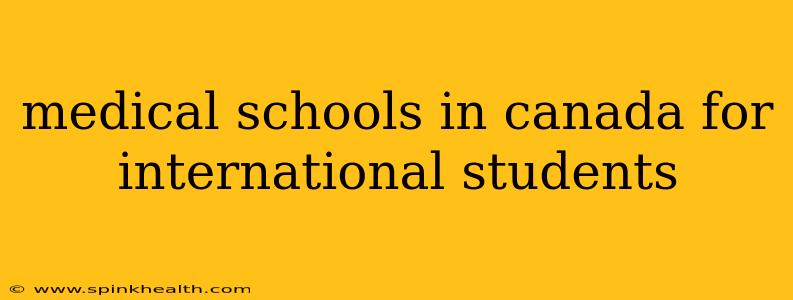Navigating the Path: Medical Schools in Canada for International Students
The dream of becoming a doctor is universal, and for many international students, Canada beckons with its high-quality medical education and welcoming environment. But the journey to securing a place in a Canadian medical school is challenging, requiring meticulous planning, unwavering dedication, and a deep understanding of the application process. This isn't just a race; it's a marathon demanding strategic preparation. Let's embark on this journey together.
My name is Dr. Emily Carter, and I've spent the last decade advising international students on their medical school applications in Canada. I've witnessed firsthand the triumphs and challenges, the late-night study sessions, and the ultimate exhilaration of acceptance. This guide, born from years of experience, will equip you with the knowledge to navigate this complex path.
Which Canadian Medical Schools Accept International Students?
Canada boasts numerous prestigious medical schools, and many welcome international applicants. However, it's crucial to understand that acceptance rates are highly competitive, irrespective of your nationality. Each school has its own unique admission criteria and application processes, so thorough research is paramount. There isn't a single "easy" medical school for international students; success hinges on a compelling application that demonstrates exceptional academic achievement, research experience, and clinical exposure.
What are the Admission Requirements for International Students?
The requirements vary slightly between institutions, but generally include:
- Exceptional Academic Record: A high GPA in prerequisite science courses (biology, chemistry, physics) is essential. Many schools also require a strong overall GPA.
- MCAT Scores: The Medical College Admission Test (MCAT) is a standardized exam crucial for admission to most Canadian medical schools. High scores are highly competitive.
- Letters of Recommendation: Strong references from professors and supervisors who can attest to your academic abilities and personal qualities are critical.
- Personal Statement/Essays: This is your opportunity to showcase your personality, motivations, and experiences that have shaped your desire to pursue medicine. It's your chance to tell your story compellingly and stand out from the crowd.
- Clinical Experience: Meaningful volunteer or paid work in healthcare settings demonstrates your commitment to the field and understanding of the profession.
- Extracurricular Activities: Participation in extracurricular activities showcases well-roundedness and leadership potential.
- English Language Proficiency: International students must demonstrate proficiency in English through tests like IELTS or TOEFL.
How Difficult is it for International Students to Get into Medical School in Canada?
The difficulty level is undeniably high. The competition is fierce, even for domestic applicants. International students face an additional layer of complexity due to varying educational systems and the need to prove their English proficiency. Success requires consistent hard work, strategic planning, and a well-crafted application that highlights your unique strengths and experiences.
What are the Costs of Studying Medicine in Canada for International Students?
Tuition fees for international students are generally higher than those for domestic students. The cost of living in Canada, especially in major cities where many medical schools are located, also needs to be factored in. Thorough financial planning and securing funding through scholarships, loans, or personal savings are crucial.
Are There Scholarships for International Medical Students in Canada?
Yes, several scholarships are available for international medical students in Canada, although securing them is highly competitive. Many universities and external organizations offer scholarships based on academic merit, research potential, and financial need. Researching and applying for scholarships is a critical part of the application process.
What are the Visa Requirements for International Medical Students in Canada?
International students require a study permit to study in Canada. The application process involves providing proof of acceptance to a designated learning institution (DLI), financial support, and meeting other immigration requirements. Careful adherence to the visa application process is essential.
This journey to becoming a doctor in Canada is a demanding yet rewarding one. By understanding the requirements, planning strategically, and crafting a compelling application, international students can significantly increase their chances of success. Remember, the dream is within reach—with dedication and the right guidance, your path to a medical career in Canada can become a reality.

